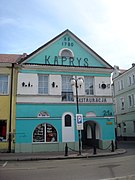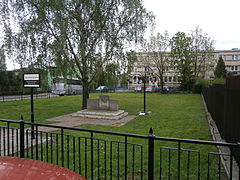|
Płońsk
Płońsk (Polish: [pwɔj̃sk] ; Yiddish: פּלאָנסק, romanized: Plonsk) is a town in central Poland with 21,591 inhabitants (2022).[1] Situated at the Płonka river in the historic region of Mazovia, it is the seat of Płońsk County in the Masovian Voivodeship. HistoryAccording to archaeological research, the Płońsk stronghold was built in the late 10th century within the early Polish state. Dating back to 1155, is the first historical record confirming the existence of Płońsk. Around the castle a group of inhabitants was formed, most of whom initially worked on the land. As a result of the fragmentation of medieval Piast-ruled Poland, it was part of the duchies of Masovia and Płock, and then it was a royal town of the Polish Crown, administratively located in the Płock Voivodeship in the Greater Poland Province. In 1400, Siemowit IV of Masovia, granted it town rights under Chełmno law, then merchants and craftsmen started to come to the town. Płońsk was located on a trade route connecting Toruń with Brześć.[2] In the early twentieth century, the population of 10,000 was equally divided between Poles and Jews. It was a centre of the garment industry.[3] The Jews lived mostly within the city, whilst the Poles were more scattered and tended to live in the countryside. On 16 October 1886 David Ben Gurion was born in Płońsk. Like him, also many other Jewish residents of the city immigrated to Palestine for Zionist reasons, spurred on by the idea of building a Jewish homeland.[4] On 14–17 August 1920, the Poles successfully defended the town during a Soviet invasion.[5] During the joint German-Soviet invasion of Poland, which started World War II in September 1939, Germany invaded the town and the Einsatzgruppe V entered the town to commit various crimes against the populace.[6] Under German occupation the town was annexed directly to Nazi Germany and was renamed Plöhnen. The Germans established and operated a court prison in the town.[7] In 1940, the occupiers expelled around 1,000 Poles, whose houses and workshops were then handed over to German colonists as part of the Lebensraum policy.[8] In September 1940, Jews from the town and the surrounding areas were imprisoned in a ghetto. Soon a typhus epidemic broke out. A hospital, a bathhouse for the sick, a pharmacy, and a folk kitchen were organized in the ghetto.[9] In total, 12,000 Jews were prisoners of the ghetto and from October 1942, they were sent to the Auschwitz extermination camp. In 1943 in Berlin, the Germans sentenced six members of the local Polish resistance movement, some to death.[10] On 16–18 January 1945, shortly before retreating, the German police carried out a massacre of 78 Poles in the town.[11] The town was administratively part of the Ciechanów Voivodeship from 1975 to 1998. Landmarks
Demographics
Museums
TransportPłońsk is located at the intersection of the Polish S7 highway (partly under construction as of February 2022) and National roads No. 10 and 50. There is also a railway station in the town. Events
In 2018, local Poles held a celebration in honor of David Ben-Gurion, who was born in the town, for the 70th anniversary of the re-establishment of the State of Israel.[15] Notable people
References
External linksWikimedia Commons has media related to Płońsk.
|
|||||||||||||||||||||||||||||||||||||||||||||||||||||||||||||||||||||||||||||||||||









